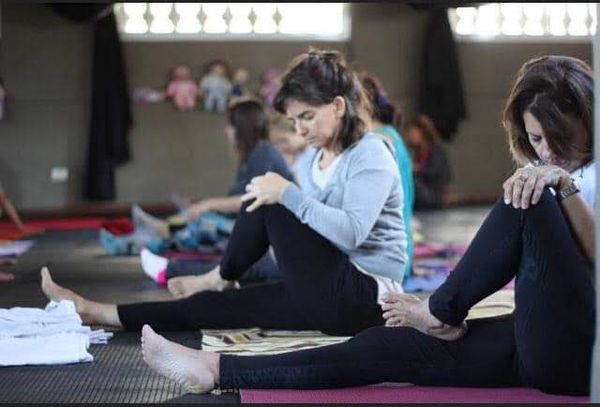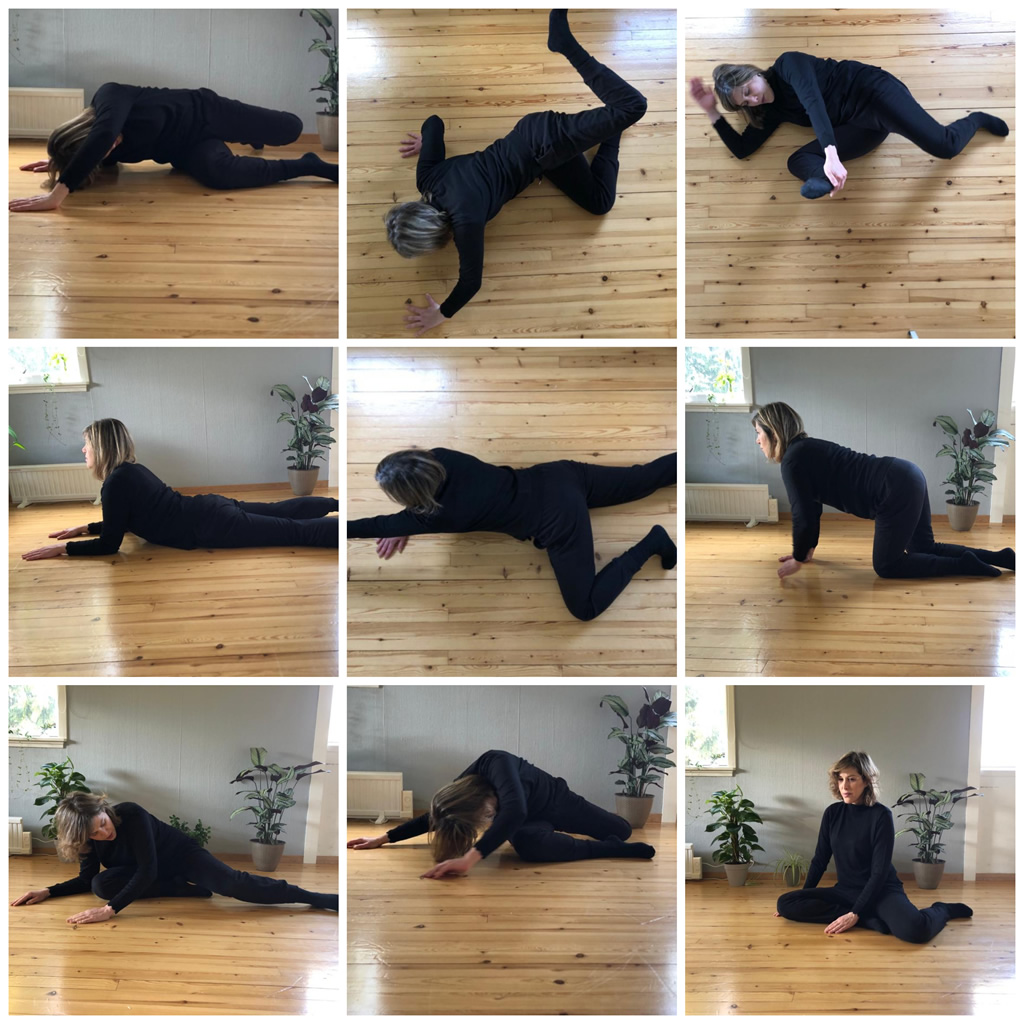Rediscover your childhood ease of movement, flexibility and vitality!
Explore your early movement learning
and motor development milestones
A developmental movement course for adults.
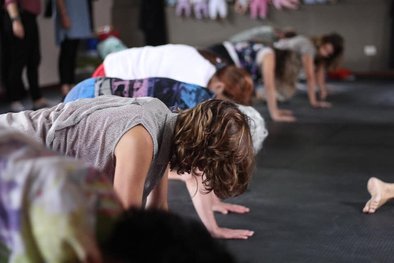
(Photo credit: Argentinian Child’Space training)
Introduction to the Child Space method with Ortal Goldshmid, Feldenkrais method practitioner and Child’Space method teacher.
“This course is organized in cooperation with www.oppmerksombevegelse.no and we use their sign up page”
A live online course in six sessions!
Participate from your home.
You will receive the recordings after each session.
Dates: Tuesdays 3rd, 10th, 17th, 24th of November and 1st and 8th of Desember.
Time: 10.30 am to 12.
Movement is humans’ first language
From the very beginning of life, there is movement. Movement is humans’ first language, and is a part of all aspects of life, communication, relation, emotion, play, thinking.
The first parent-child connection is made when a mother feels her baby moves in her womb. A newborn crawls his way to his mother’s breast to take the first breastfeed.
A child gains its first experience of the outside world through movement.
During the first year of life we acquire thousands of new movement patterns and abilities, creating neural pathways between the body and the brain.
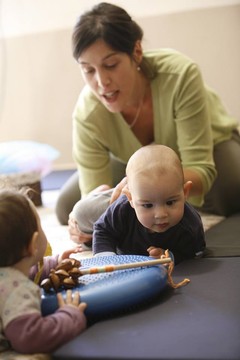
Ortal Goldshmid, Child’Space and Feldenkrais educator working with a baby in her practice.
What if you can go back in time and re-explore
this organic process of movement development?
In this series of 6 lessons based on the Child’Space method (based on the Feldenkrais method) we offer you the opportunity to repeat fundamental milestones in humankind development with professional guidance for your personal growth and learning.
We will explore developmental stages such as lifting the head, eye-hand connection as the foundation of reaching and fine motor skills, rolling in various ways and directions, discovering hand-foot play, crawling in various fashions and coming to sit from different positions. In the next parts of this series of this course we will explore coming to stand, walking and more complex skills.
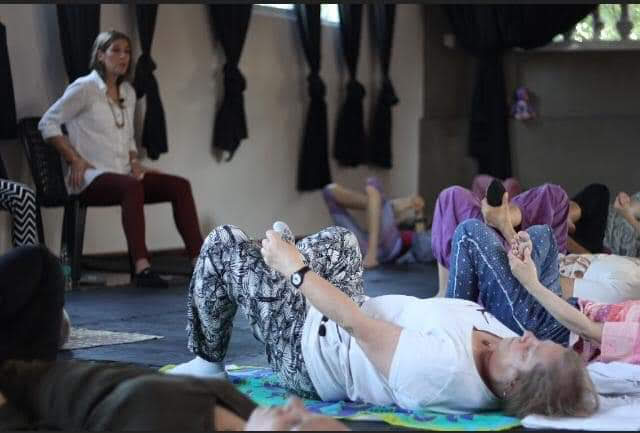
Learn through playful movement exploration
For some participants it can possibly be the first time to experience some of these stages and for all a great opportunity to discover new possibilities of movement, transitions and sensations to enrich your repertoire and body awareness.
Gaining an experiential understanding of the way children learn through playful movement exploration, can also help you Increase your appreciation of children’s play, to create and safeguard the conditions for play to exist and flourish.
“This course is organized in cooperation with www.oppmerksombevegelse.no and we use their sign up page”
Benefits you will experience from this online series of classes
Improve your balance
Widen your movement repertoire and improve your balance, orientation, and coordination
Bring vitality
Bring more vitality, flexibility and playfulness to your movement
Rediscover your childhood
Rediscover your childhood ease and flow of movement.
Reconnect with yourself
Reconnect with yourself by going back to primary stages in your childhood
Motor development milestones
Learn through self-experience about major milestones in infant motor development and how babies, children as well as adults learn through movement.
Improve connection and coordination
Improve connection and coordination between your upper and lower body parts.
Feel more grounded
Feel more grounded, self-supported, and capable in the face of challenging moments in your daily life.
Improve movement for daily activities
Improve movement for daily activities, walking, sitting, getting up and down etc
Improve movement for sport
Improve movement for sports activities such as running, skiing, skating, martial arts, swimming etc.
All aspects of development are addressed in the workshop: gross and fine motor skills, sensory stimulation, balance, coordination and orientation, vision, cognitive and social-emotional growth.
Participants report that the changes they experience are not only motoric but reflect an improvement in their well being and personal growth.
This course should be interesting and useful for:
- Anyone interested in more ease of movement, with less struggle and discomfort.
- Anyone interested in self-growth and development through movement.
- Movement teachers and bodyworkers, Yoga teachers, Feldenkrais teachers, physiotherapists, etc.
- Professionals working with children at kindergarten and school.
- Dancers, athletes, actors, musicians.
- Coaches, psychotherapists, trauma therapists.
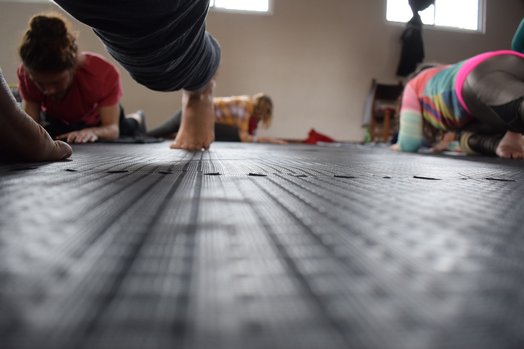
About Child’Space and the Feldenkrais method
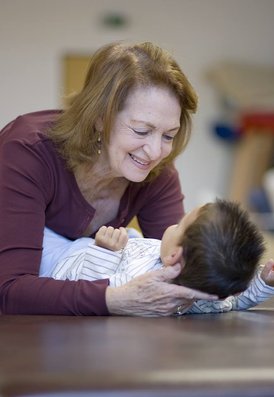
Feldenkrais and Child’Space are both gentle approaches that will lead you to learning to shift out of long-held habits of movement and behavior.
In this workshop you will experience six lessons of developmental movement exploration (DME) that were specifically developed by Dr. Chava Shelhav, based on the Feldenkrais method and her work with children and babies.
The result is improved efficiency, balance and comfort in movement, and for many, corresponding changes in other aspects of one’s life.
“This course is organized in cooperation with www.oppmerksombevegelse.no and we use their sign up page”
Course structure and content
Six online classes.
90-minute Developmental movement exploration classes.
Each class consists of a 60 minute DME lesson, and approximately 30 minutes for a discussion and analyzing the components of movement and their contribution to all aspects of development.
The plan will be adapted to the needs of the group.
The topics of the six sessions:
1. Lifting the head
The foundation of upright posture and balance.
When a baby gains head control in prone you can see the spark of curiosity and happiness in her eyes, now that she can turn her head to track your voice and all that is happening around her!
Lifting the head involves our whole selves all the way down to our toes. It is the first step to counter gravity and develop balance, bringing our eyes to the horizon, beginning to form the curvatures of our spine.
In this session you will revisit and refine this process, develop coordination between your front and back to help create easy movement of your neck and head.
2. Rolling like a baby
There are many ways to roll! it’s fascinating to see the process each baby goes through, some even roll from one side of the room to the other…
Rolling is the beginning of locomotion, movement in space, change of positions and orientations. In everyday life, efficient rotation and rolling helps us transition from lying down to sitting, to getting up and down, to reverse any movement we do.
In this session you will explore and refine your orientation, balance and spatial awareness, your sense of mid-line, the eye-hand connection and the ease of rolling.
3. Hand-foot play
You might have seen the joy of exploration in babies holding their feet and putting them into their mouth?
Hand foot play develops the baby’s growing sense of herself, discovering her feet for the first time, developing her body awareness and new playful movements and transitions.
In this session you will improve your flexibility and coordination between your limbs and trunk, between your upper and lower body, playing with levers and balance.
4. Belly Crawling- moving forward:
Have you seen the excitement of a baby learning to crawl? Now gaining the freedom to crawl away, explore, discover and come back!
Learning to crawl is a complex process for the developing baby, involving coordination of the eyes, head, spine and all the limbs!
In this session you will gain the sense of support from the ground and learn how to use it to initiate movement forward, developing coordination between both sides of your body, head, eyes, spine and all limbs, learning to organize your whole self for easy movement.
5. Crawling on all fours
Rising from the ground:
Now, moving further and faster, exploring and discovering a larger space and playing more vigorously!
Learning to crawl on all fours, the baby now masters the challenge of rising from the ground, bearing a great deal of body weight and balancing on arms and legs, and more advanced coordination of the eyes, head, spine, the limbs, balance and body weight!
Crawling is a developmental stage that involves motor, cognitive, and emotional aspects. The experience of attachment and separation, to venture out and come back, is the basis of the infant’s ability to create social and personal connections as she moves on to preschool and to school.
In this lesson you will explore the coordination between the movement of the pelvis and the shoulder girdle, involving also the spine, neck, head and eyes, while at the same explore the process of moving from homolateral movement to contralateral movement, finding support from the ground, shifting body weight and improving balance.
6. Transition to sitting up
Welcome to the world of grown-ups, sitting up independently, gaining a new perspective on the world!
The baby can now enjoy being part of family dinner table, imitate gestures and participate in the conversation better and master enjoyable skills such as putting food in the mouth!
Sitting up involves developing dynamic posture and mobility, trunk control, balancing the head on top the spine and neck. The baby now expands his play and interaction, having his two hands available to explore and coordinate with vision facilitating the development of fine motor skills.
In this lesson you will explore how a variety of movement transitions and sequences can improve your posture in sitting, the way your back and head hold themselves without unnecessary effort, the sense and usage of your sitting bones.
Date, time and price
Dates: Tuesdays 3rd, 10th, 17th, 24th of November and 1st and 8th of Desember.
Time: 10.30 am to 12.
Price: 1950 kr.
Discount: 1450 kr for students, pensioners, or otherwise have low funds.
To get the reduced price, write discount-1450 in the coupon field on the sign-up page.
Length: 1,5 hour. Approximately 1 hour for the exercise and 30 minutes for presentation, questions and sharing.
All participants will receive the recordings from the sessions after each session.
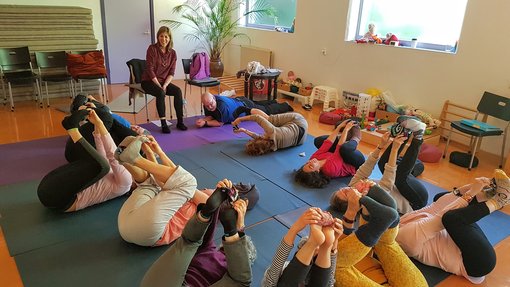
(Advanced Child’Space training in Amsterdam 2018)
“This course is organized in cooperation with www.oppmerksombevegelse.no and we use their sign up page”
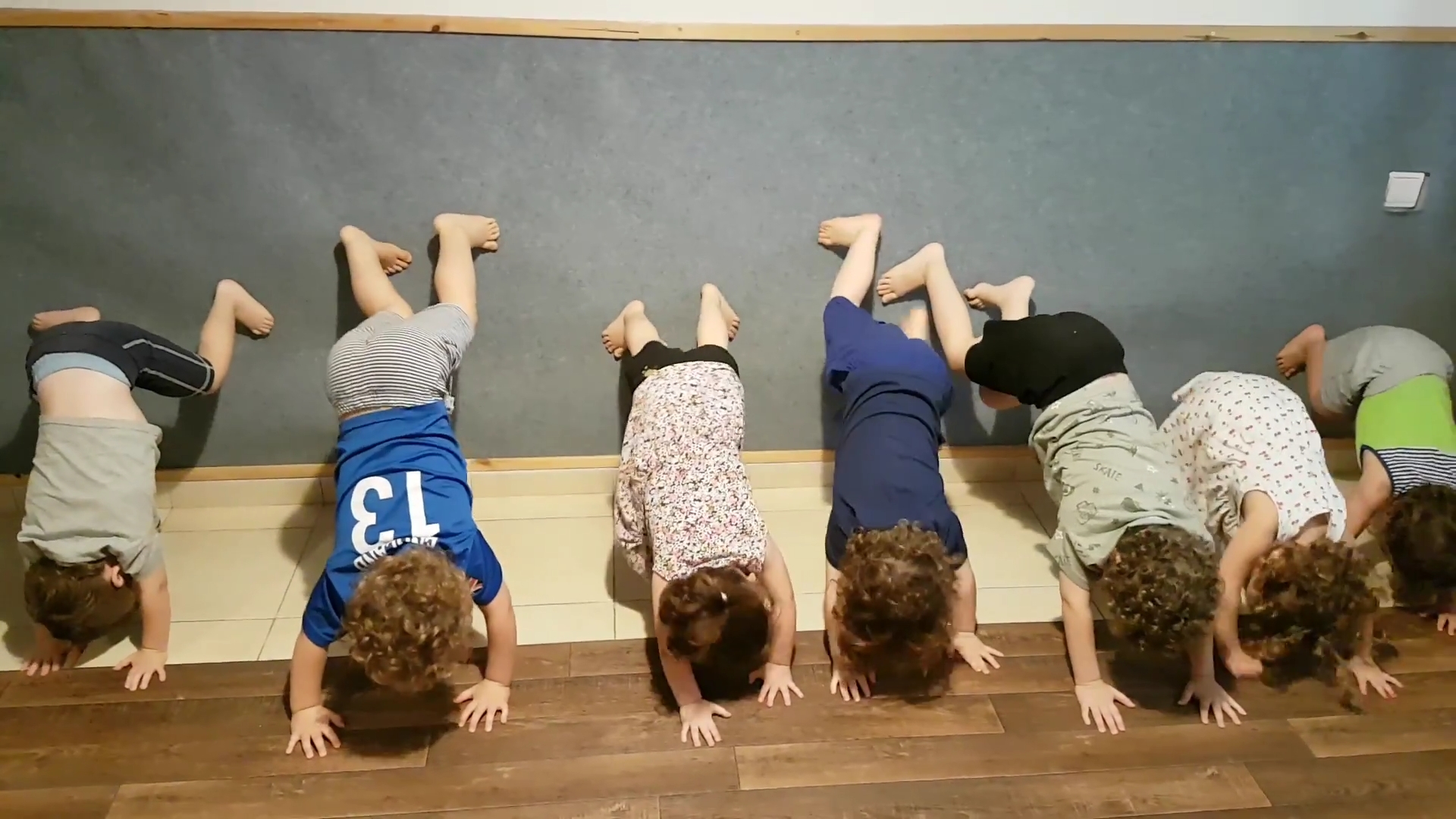
This is part one of a three part series of 6 sessions
This is the first part of a 3 part series of movement exploration lessons for adults covering the major motor development milestones of children.
The three parts cover the major milestones from:
- Part one: From head lifting to crawling.
- Part two: From crawling to walking.
- Part three: Motor skills for Toddlers.
Click here for a description of all lessons in part one.
More information about parts two and three will come later.
This series of workshops also serves as an introduction to the Child’Space method professional training.
The importance of movement, interaction and play!
The first years of a child’s life set the stage for future growth. In our early development, we learn about ourselves and our environment through movement, interaction, and play, exploring the world with our senses.
It is impossible to separate out the motor, emotional, cognitive, and social elements at any given stage of development.
Our well-being and self-confidence during our first years of life is dependent on our total abilities in all the elements and on the quality of support and dialogue that we receive from our parents and caregivers.
For each experience we have with another person or with our own body in space, and unconscious experience is created on the nonverbal level, and is remembered by the body.
Self-appreciation and self-image are both intimately connected to motor development. Memories of success nourish our motivation to perform familiar activities again and again and to dare to attempt new ones (Shelhav, Chava. Child Space North Atlantic Books).
As babies, we should go through this process of trial and error until we arrive at a movement that suits us and is the most adapted to each situation. The richer our repertoire of movement and transitions the better our ability to act in a changing environment.
In an Ideal world, all children were given the best conditions for development, but this is often not the reality for a number of reasons like: illness, injury, emotional trauma, postpartum depression, complicated relationships in the family, a divorce, low socioeconomic status or simply lack of knowledge and awareness or lack of a supportive social safety net.
In this workshop you can go back in time and re-explore basic developmental stages in a safe learning environment. For some participants it can possibly be the first time and for others a great opportunity to repeat and discover new possibilities of movement and sensation out of awareness.
Today, children play more with screens and less outdoors. Attention disorder and behaviour problems are more common worldwide. Gaining basic understanding of the importance of playful movement exploration as an organic way of learning, can help us appreciate their play and create the conditions for it to exist.
Ortal Goldshmid
Educator of the Feldenkrais and Child’Space Methods
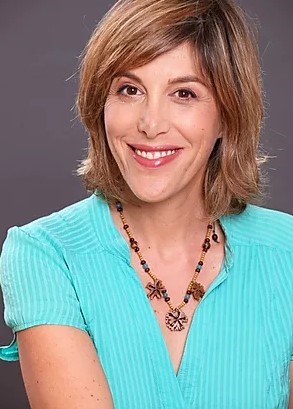
Ortal Goldshmid
Educator of the Feldenkrais and Child’Space Methods, and holds a Bachelor of Social Work degree.
Ortal has over 15 years of practical and educational experience, working and teaching around the world. She has co-developed an unique approach for professionals working with babies and parents in groups, which is taught successfully in trainings being held in The Netherlands, in Israel and Online.
Ortal is a part of the international educational staff of the Child’Space certification trainings, and has been teaching in Argentina, Austria, Japan and Israel.
Ortal has graduated from the Child’Space training program in 2004, held by Dr. Chava shelhav, one of Moshe Feldenkrais’s first students and assistants, and the founder of the Child’Space Method for babies and their caregivers based on the Feldenkrais Method. Since her graduation, Ortal was trained by Dr. Chava Shelhav, serving in the educational team since 2010.
Ortal teaches Awareness Through Movement classes and gives individual Functional Integration lessons and is well experienced in working with patients who suffer from neurological disturbances such as Sciatica, Guillain-Barré and Cerebral Palsy. She has gained vast clinical experience in early childhood development at private and public family health care centers in Israel, working with children with various neurological, motor and sensory challenges such as: Premature babies, Delayed milestones, Torticollis, poor Balance, Coordination and Orientation, Hip Dysplasia, Spina Bifida, Special needs and Genetic Disorders. Furthermore, Ortal was part of the establishment and operation of a special governmental program for families at-risk with young children.
Ortal is originally from Israel, but currently lives in Norway together with her spouse and two daughters.
As in movement, Ortal is constantly pursuing new ideas to improve her therapy and trainings. She brings into her work an innovative and joyful approach.
“This course is organized in cooperation with www.oppmerksombevegelse.no and we use their sign up page”
Testimonials
What People Are Saying
“The training gave me a lot of practical ideas and made me believe in myself.
you are not only a wonderful teacher, you are an inspiring woman“
“After the last lesson I went to Krav maga training (self defense training) and noticed a better flow in my movements.
It was a big difference for me, I was totaly in the flow and we kept going in 3 hours.
My training partner, who trained with me the last 6 years, noticed the difference in me and we had a very good time.”
“Thank you for the lessons!
Before the course I was thinking I have a good deep squat but now I can go even deeper.
It is also easier for me to sit longer in the deep squat.”
“Dear Ortal,
I found you when I had already scheduled a date for surgery in the lumbar spine. With your magic hands, enormous sensitivity and professionalism, my pain was gone as well as the need for surgery.
Now I am back to my active life style which is so significant to my physical and mental well being.
I deeply thank you for every moment of therapy, your encouraging words and especially for the results.”
“After the sessions I always feel good, centered, more in connection with my body.”
“So much learning in such a quite and joyful and powerful atmosphere you created!”
“After the rolling lesson- I am happy, I feel a bubbling feeling inside.”
“…The learning is at a high standard and the wonderful atmosphere supports each and every student.”
“After doing the first lesson I felt more in balance and more relaxed, and that more of my foot was in contact with the ground.
When I was out riding my horse I felt more accurate in my movements, more in control.”
“I think it works deep into our inner world, happy relaxed feeling.
Perfect Ortal, I love this type of movement.”
“It feels so meaningful to do these early movements – as it connects me to a “deeper” part of myself, and takes me out of the head and into my body.”
